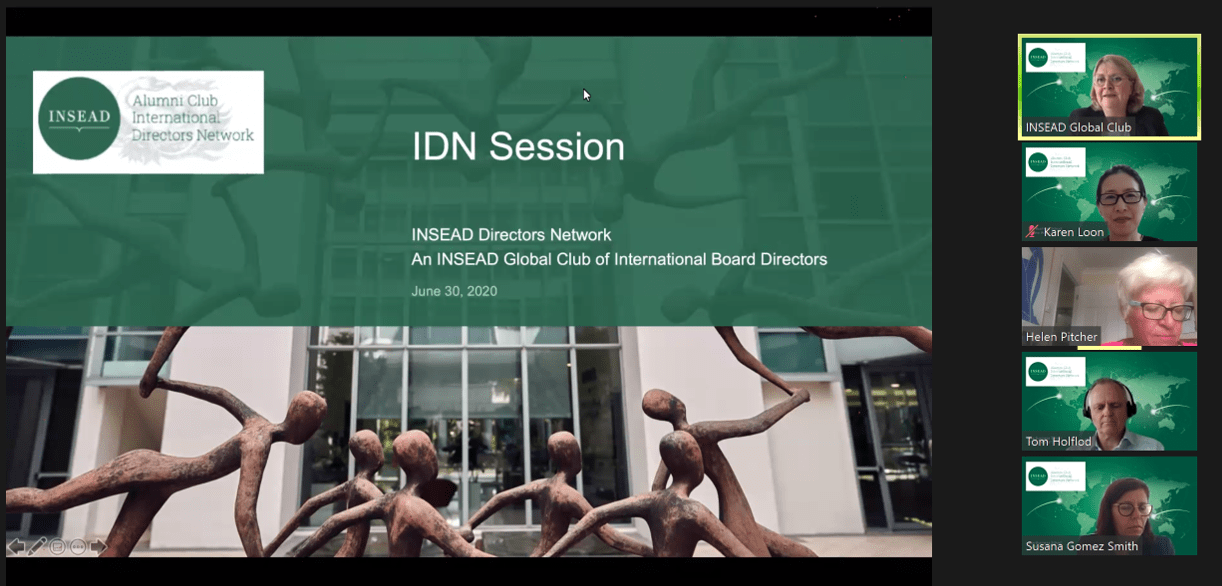By Florence Kaminska, IDP-C and Non-Executive Director
The COVID19 crisis led to the abrupt halt of an economic model, increasingly challenged in the past decade with climate and social warnings. Faced with such unprecedented situation, in varying degrees, consensus around the world was to choose health over economy, humanity over profit. The speed of reaction and solidarity – displayed by individual actions, state intervention to protect employment, companies adapting their production to produce masks, gel, ventilators … gave us a glimpse of what ‘the world of tomorrow’ could look like, demonstrating the impact of citizenship and value driven decisions.
It also raised expectations on the way companies create value in future and address the social impact of the decisions they make.
The pandemic broke out in a period of great existing instability and unrest resonating across the world through social media. Citizenship pressure is likely to increase and have a louder voice, as the economic consequences of COVID19 crisis massively impact employment. It will present great risk for society and business, but equally a great opportunity for companies that are delivering value for both shareholders and stakeholders (1). In this context, the Board’s role in keeping a moral compass whilst ethically charged, short and long-term, decisions are made and their consequences managed, is key.
What value does the Company create and for whom?
Beyond their responsibility to the long-term sustainability of the company, the current context is a compelling call for boards to drive, as part of their duty of care, the value the company is creating to society at large. Such commitment will increasingly determine the company’s ability to access market capital, attracting and retaining talents and ultimately impacting brand reputation and Investors Relations. Private investors increasingly want to see their savings and investments to produce as much good as dividend and are becoming more demanding. Equally, many people not just millennials, want to work for an organisation whose philosophies and actions resonate with them intellectually and emotionally. As the debate on shareholder Vs. stakeholder primacy is gaining momentum, the ‘S’ in ESG is gaining a new prominence in the Boardroom, accelerated by the COVID19 humanitarian and economic impact on businesses, communities and people’s lives. The way boards chose to approach cash and liquidity will have both social and governance implications and, as such imposing social responsibility at the highest strategic level. (2)
Are we moving towards new dimensions of leadership?
Much publicised heads of state, New Zealand, Germany, as well as CEOs from Danone, Unilever, AirBnb, to name a few, have demonstrated, beyond they undoubted ‘technical’ talent and experience, a form of moral authority and leadership attributes already emerging as differentiators such as accountability, humility, transparency, proximity as well as empathy and compassion. These new leadership attributes will equally impact the board profiles and composition, as such public examples raised the level of awareness on ‘purpose leadership’. (3)
How does it impact the Board?
The social impact of decisions made by companies, imposing a form of moral compass to navigate these complex times, is likely to determine the levels of trust from stakeholders, and ultimately impact the bottom line and the shareholders. Holding the moral compass is not about holding management accountable for vague, all being righteous principles. It is about maintaining a dialogue with shareholders whilst collaborating with executives to manage the complexity and conflicting needs of the multiple stakeholders, assessing risks, opportunities and trade-offs, setting priorities and measuring purpose-based decisions.
Holding the moral compass is not about holding management accountable for vague, all being righteous principles. It is about maintaining a dialogue with shareholders whilst collaborating with executives to manage the complexity and conflicting needs of the multiple stakeholders, assessing risks, opportunities and trade-offs, setting priorities and measuring purpose-based decisions.
To do so, some fundamentals will require attention, such as:
- Defining or revisiting the corporate social purpose – 2008 Financial crisis led to new governance framework and enhanced regulations but did not address social unbalances. COVID19 crisis is accelerating societal impact in governance through by-laws and legislations. Proactively embracing the trend and using existing best in class examples will determine the sustainability of a business starting with access to capital and talents (4). The ability to measure the authenticity and results of their actions will impact the reaction of both stakeholders and shareholders, as will the Board ability to drive an ESG culture.
- Aligning scorecards and KPIs – Driving an ESG culture implies revisiting governance, scorecards and KPIs. Finance may have neglected qualitative and quantitative assessment of management in the past. As the concept of the Triple bottom line expands (5), there is likely to be more effort from the investors side in understanding how to manage companies well in future and pushing their goals under the OECD agenda or reference the UN’s SDG agenda (6). Remuneration committees will consequently need to reflect these new imperatives in the Executives compensation & incentives, including those of the Board.
- Enriching the composition of the Board – The Chair brief is expanding as his/her effectiveness will be determined by the ability to interpret complex ESG landscape and implications of shifting social, political and regulatory expectations and their associated risks. The pandemic situation has also revealed new skillsets required among the non-executive board members, such as technology, HR, alternative financing, restructuring, and critical leadership attributes such as collaboration, agility, humility and courage. Leading by example will become an integral part of the role of the Board, promoting agility to adapt fast to new challenges whilst never conceding on the violation of core ethical principles related to the corporate social purpose. The Nomination Committees are likely to revisit the needs, profiles as well as the selection criteria, methods and breadth of candidate pipeline.
An opportunity to shape the ‘world of tomorrow’
Company boards will play a key role in creating the ‘world of tomorrow’ as they guide and hold management accountable to rethinking the company social purpose, embedding it in their decision making as they navigate the complex post COVID19 economic landscape.
The writer George Sanders used the following analogy for the current COVID19 moment, ‘we’ve slipped on ice but haven’t hit the pavement yet. We are caught in a suspended state between losing control and feeling the full impact’.
Companies will be faced with tough dilemma. Cost savings and profit motives, which may have served them well in the past are likely to backfire (7). Without a moral compass in making tough decisions and building a more sustainable model, in the way wealth is created and redistributed, the prophecy of the French writer, Michel Houellebecq , ‘the world after will be the same…in worse’ may well materialise. Yet, ESG has raised in awareness and reaching an inflection point. The priorities Boards drive, the courage to do ‘the right thing’, the moral authority they hold and their leadership in shaping sustainable and equitable long-term corporate strategies will define the, much hoped for, ‘World of tomorrow’.
References
(1) https://corporatefinanceinstitute.com/resources/knowledge/finance/stakeholder/
(2) Fidelio partners. Cash is King! ESG? May, 10 2020
(3) https://hbr.org/2020/03/a-time-to-lead-with-purpose-and-humanity
(4) Examples such as B Corp certified companies, https://bcorporation.eu/
(5) https://www.business.com/articles/triple-bottom-line-defined/
(6) http://www.oecd.org/dac/sustainable-development-goals.htm https://www.un.org/sustainabledevelopment/sustainable-development-goals/
(7) When Crisis strikes lead with Humanity. Harvard Business Review April 23 2020, Doug Sundheim





